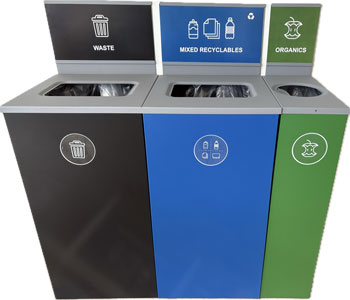UCI Health aims to further reduce its environmental impact with new waste bins
Sorting organics part of overall food waste reduction strategy

Orange, Calif. — New waste bins being installed at UCI Medical Center, the flagship hospital of UCI Health in Orange, are a step forward in the academic health system’s commitment to do its part to understand, measure and reduce waste streams across all of its facilities.
The black, blue and green bins, which can sort garbage, recyclables and organics, will eventually be installed across all UCI Health hospitals and ambulatory locations as part of the Waste Matters initiative.
“These new waste bins are an important step toward reducing our overall environmental impact, supporting responsible waste management and transforming into a forever organization,” said Nathan Shinagawa, chief operating officer and senior vice president at UCI Health.
“We are proud to continue implementing new sustainability initiatives as one of California’s largest academic health systems.”
Hospitals generate 5 million tons of waste yearly. In 2024, UCI Health generated 4,452 tons; its target is to reduce the amount generated currently from more than 29 pounds per adjusted patient day (APD) to 20 pounds per APD by 2030.
Keeping organics out of landfills
About 85% of hospital waste is non-hazardous recyclable materials and organic waste, including wood, paper and food, according to the World Health Organization.
Food waste, the most common landfill material, is a major problem in the U.S. and in California. According to CalRecycle, enough food to make 2.5 billion meals each year goes to landfills instead of the mouths of the one in five people in the state who don’t have enough to eat. When sent to a landfill, such waste breaks down into methane gas, which is 84 times more potent than carbon dioxide.
UCI Health donates its excess edible food to Chefs to End Hunger, a nonprofit food recovery organization. In 2024, the health system donated 1.91 tons of excess prepared food that is used to feed communities in need.
In conjunction with edible food donations, UCI Health is working to address overproduction in its kitchens.
Commitment to waste reduction
The installation of bins is one of several initiatives at UCI Health aimed at reducing, diverting or minimizing waste. Others include:
- Reprocessing single-use medical devices
- Reusable isolation gowns
- Recycling soft plastics in the operating rooms and pill bottles in the pharmacy
- Donating unused medical supplies
- Eliminating plastic bottles and single-use plastics in the cafeteria
Learn more at ucihealth.org/sustainability
About UCI Health
UCI Health, one of California’s largest academic health systems, is the clinical enterprise of the University of California, Irvine. The 1,461-bed system comprises its main campus UCI Health — Orange, its flagship hospital, the UCI Health — Irvine acute care hospital and medical campus, four hospitals and affiliated physicians of the UCI Health Community Network in Orange and Los Angeles counties and a network of ambulatory care centers across the region. UCI Health — Orange provides tertiary and quaternary care and is home to the only Orange County-based National Cancer Institute-designated comprehensive cancer center, high-risk perinatal/neonatal program and American College of Surgeons-verified Level I adult and Level II pediatric trauma center, gold level 1 geriatric emergency department and regional burn center. Powered by UC Irvine, UCI Health serves 5.6 million people in Orange County, western Riverside County and southeast Los Angeles County. Follow us on Facebook, Instagram, LinkedIn and X (formerly Twitter).




